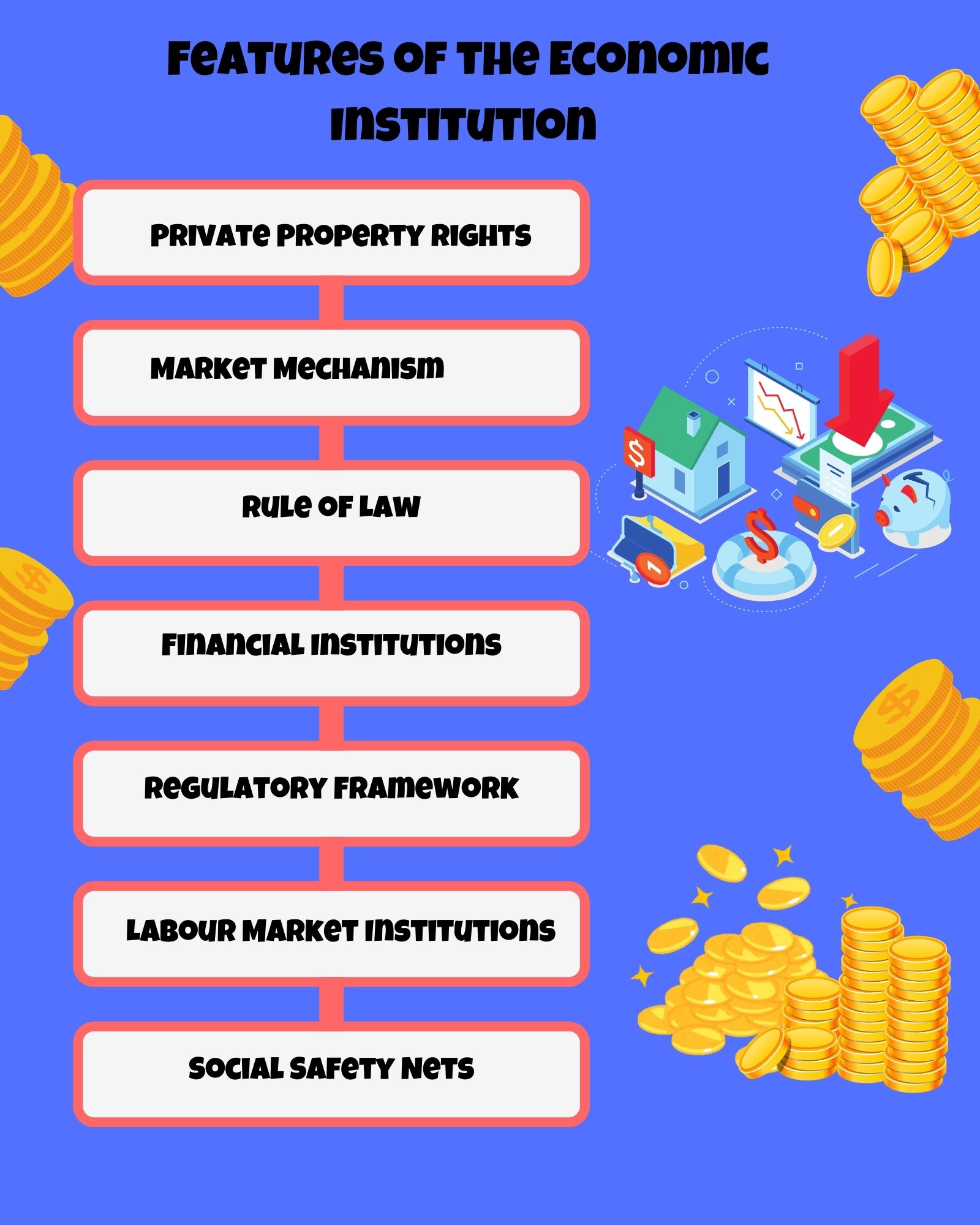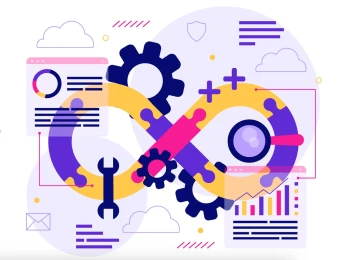- Table of Contents
- Introduction
- What Is the Economic Institution?
- The Economy as a Social Institution
- Features of the Economic Institution
- 1. Private Property Rights
- 2. Market Mechanism
- 3. Rule of Law
- 4. Financial Institutions
- 5. Regulatory Framework
- 6. Labour Market Institutions
- 7. Social Safety Nets
- Objectives of the Economic Institution
- 1. Economic Growth and Development
- 2. Price Stability
- 3. Full Employment
- 4. Income Distribution and Social Welfare
- 5. Environmental Sustainability
- Challenges Faced by Economic Institutions
- Economic Inequality
- Technological Disruption
- Environmental Sustainability
- Global Trade Tensions
- Political Instability
- Ageing Populations
- Innovation and Technology in Economic Institutions
- Digital Platforms
- Artificial Intelligence (AI) and Big Data
- Blockchain Technology
- Fintech Innovations
- Automation and Robotics
- Conclusion
Introduction
Economic institutions play a pivotal role in shaping the fabric of any society. As a key component of social structure, it provides the framework for producing, distributing, and consuming goods and services. Understanding the features and objectives of economic institutions is crucial for comprehending their significance in fostering societal growth and well-being. In this blog post, we will explore the concept of economic institutions, discuss their role as a social institution, and delve into the key features and objectives that drive their functioning.
What Is the Economic Institution?
At its core, an economic institution refers to the set of formal and informal rules, norms, and practices that govern economic activities within a society. It encompasses the organisations, systems, and processes through which individuals, businesses, and governments interact to produce, exchange, and utilise resources. Economic institutions provide the necessary structure and order for economic transactions and are essential for fostering economic development and stability.
The Economy as a Social Institution
The economy is not a standalone entity; rather, it is deeply intertwined with society and functions as a social institution. As a social institution, the economy serves as a mechanism for allocating resources and satisfying human needs and wants. It influences and is influenced by social, cultural, and political factors, reflecting the values and priorities of a particular society.
The economy as a social institution affects various aspects of human life, such as employment, income distribution, wealth creation, and the overall standard of living. It is a dynamic system that continuously evolves and adapts to changing circumstances, technological advancements, and societal needs. Economic institutions contribute to forming social relationships, power structures, and the overall social fabric of a community.
Features of the Economic Institution
Economic institutions, with their multifaceted features, form the backbone of any thriving society. These intricate mechanisms provide the necessary structure, rules, and order for economic activities, ensuring stability, growth, and prosperity. Let's delve into the core features that define economic institutions and navigate the framework of prosperity they create.

1. Private Property Rights
At the heart of economic institutions lies the concept of private property rights. These rights empower individuals and businesses with legal ownership and control over resources, be it land, buildings, intellectual property, or other assets. Secure property rights create an environment where individuals can confidently invest, innovate, and undertake entrepreneurial ventures. When people know their hard-earned assets are protected, they are more likely to take risks, start businesses, and contribute meaningfully to economic growth. It's the foundation upon which economic freedom is built, encouraging a sense of societal ownership and responsibility.
2. Market Mechanism
One of the defining features of economic institutions is the market mechanism. In a market-oriented economy, goods and services are exchanged through the interaction of supply and demand. This mechanism not only determines prices but also allocates resources efficiently. When demand for a particular product or service increases, prices rise, signalling producers to supply more, thereby balancing the market. The market mechanism ensures that resources are utilised optimally, preventing wastage and promoting the production of goods and services society values the most. It fosters healthy competition, driving businesses to innovate and improve their offerings, ultimately benefiting consumers and enhancing overall economic efficiency.
3. Rule of Law
Within the realm of economic institutions, the rule of law operates as the bedrock of stability and trust. A robust legal framework ensures the enforcement of contracts, protection of property rights, and resolution of disputes. Individuals and businesses are more likely to engage in economic activities when they have confidence in the legal system. Contracts are honoured, the property is safeguarded, and disputes are resolved fairly. This stability creates a conducive environment for domestic and foreign investments, as investors are assured of legal protection for their assets. The rule of law fosters a sense of security and predictability, encouraging economic activities to flourish.
4. Financial Institutions
Economic institutions encompass various financial intermediaries such as banks, credit unions, and capital markets. These institutions play a pivotal role in the economy by facilitating the flow of funds between savers and borrowers. Savers deposit their money in financial institutions, lending these funds to businesses and individuals seeking capital for various purposes. This circulation of capital fuels investments, allowing businesses to expand, innovate, and create employment opportunities. Moreover, financial institutions provide essential services like payment systems, enabling seamless transactions and contributing to the economy's overall efficiency. They act as the lifeblood of economic activities, ensuring the smooth functioning of businesses and supporting economic growth.
5. Regulatory Framework
Economic institutions operate within a regulatory framework designed to maintain fairness, protect consumers, and address market failures. Regulations ensure businesses operate ethically, preventing monopolistic practices and ensuring a level playing field for all participants. Regulatory bodies enforce antitrust laws, monitor environmental standards, and oversee financial transactions, among other responsibilities. These regulations uphold the integrity of economic activities by preventing exploitation and promoting ethical conduct. They also play a crucial role in consumer protection, ensuring that products and services meet quality standards and are safe for consumption. The regulatory framework maintains the balance between the interests of businesses, consumers, and society as a whole, fostering trust and confidence in the economic system.
6. Labour Market Institutions
Economic institutions extend their influence to labour markets, regulating various aspects of employment relationships. Minimum wage laws set a baseline for fair compensation, ensuring that workers receive a reasonable income for their labour. Collective bargaining allows workers to negotiate with employers collectively, balancing the power dynamic between labour and management. Employment protection laws provide job security, safeguarding workers from arbitrary dismissal and ensuring employment stability. These labour market institutions play a crucial role in balancing the interests of workers and employers, fostering a harmonious work environment. By promoting fair compensation, job security, and workers' rights, these regulations contribute to social welfare and enhance society's overall quality of life.
7. Social Safety Nets
Economic institutions may include social safety net programmes designed to support vulnerable populations and alleviate poverty. These programs provide financial assistance, healthcare, education, and other essential services to individuals and families facing economic hardship. Social safety nets act as a cushion, offering protection against unforeseen circumstances such as unemployment, illness, or disability. These programs promote social cohesion and inclusivity by addressing social and economic vulnerabilities. They reduce inequality, enhance social mobility, and create a safety net, ensuring no one is left behind. Social safety nets contribute to society's overall well-being, fostering a sense of security and community support.
In essence, these features collectively form the intricate tapestry of economic institutions. Their interplay creates a stable, transparent, and inclusive environment for thriving economic activities. As these institutions evolve and adapt to society's changing needs, they continue to shape the destiny of nations, steering them toward progress, prosperity, and shared well-being. Through their unwavering commitment to fairness, inclusivity, and ethical conduct, economic institutions remain the guardians of societal growth, ensuring a brighter and more equitable future for all.
Objectives of the Economic Institution
According to Analytic Steps, economic institutions are fundamentally designed to address the fundamental human needs that drive their existence. As a result, each sector within the economy plays a crucial role in fulfilling these needs and ensuring societal well-being. In addition to that, economic institutions have a trove of objectives, including:
1. Economic Growth and Development
Central to the objectives of economic institutions is the pursuit of sustained economic growth and development. By efficiently allocating resources, encouraging innovation, and creating an enabling environment for investment and entrepreneurship, these institutions lay the foundation for economic vibrancy. Economic growth leads to increased production, higher employment rates, and enhanced living standards, according to the International Monetary Fund. It paves the way for developing infrastructure, education, and healthcare systems, improving citizens' overall quality of life. Through strategic policies and frameworks, economic institutions stimulate economic activities, fostering a robust economy that benefits individuals, businesses, and the nation as a whole.
2. Price Stability
Maintaining price stability is a critical objective for economic institutions. Price stability refers to avoiding excessive inflation or deflation, ensuring that the purchasing power of a currency remains relatively constant over time. Stable prices provide predictability for consumers, investors, and businesses. When people can anticipate the future value of money, they make informed decisions regarding spending, saving, and investments. Economic institutions employ monetary and fiscal policies to curb inflationary pressures, promoting consumer and investor confidence. Price stability fosters a conducive environment for economic activities, contributing to long-term planning and sustainable growth.
3. Full Employment
Achieving full employment is a fundamental objective of economic institutions. Full employment occurs when all individuals willing and able to work have access to employment opportunities. Economic institutions work towards creating a conducive environment for job creation by supporting labour market flexibility, providing training and education programmes, and promoting workforce development initiatives. Low unemployment rates enhance individual livelihoods and contribute to social stability. People with access to meaningful employment are more likely to contribute positively to society, fostering a sense of belonging and purpose.
4. Income Distribution and Social Welfare
Economic institutions are pivotal in ensuring equitable income distribution and promoting social welfare. These institutions address income disparities and reduce poverty through progressive taxation, social safety net programs, and targeted interventions. Policies and programs are designed to support vulnerable populations, providing them with essential services such as healthcare, education, and financial assistance. By reducing inequality, economic institutions enhance social mobility, empowering individuals to break the cycle of poverty and improve their quality of life. Social welfare initiatives create a safety net, ensuring no one is left behind, and fostering a sense of community and solidarity.
5. Environmental Sustainability
In the face of environmental challenges, economic institutions have recognised the imperative of environmental sustainability. Sustainable development aims to meet the needs of the present without compromising the ability of future generations to meet their own needs. Economic institutions integrate eco-friendly practices into economic activities, promoting clean technologies, renewable energy sources, and environmentally conscious production methods. Policies and regulations are implemented to mitigate environmental degradation, combat climate change, and preserve natural resources. By fostering environmental sustainability, economic institutions contribute to preserving ecosystems, biodiversity, and the planet's overall health.
Initiative | Objective | Impact |
Paris Agreement | Mitigate climate change effects | Reduce greenhouse emissions |
Clean Energy Incentives | Promote renewable energy sources | Lower dependence on Fossil fuels |
Sustainable Agriculture Programmes | Improve farming practices | Enhance food security and reduce environmental impact |
Circular Economy Practices | Reduce waste and promote recycling | Minimise resource depletion and waste generation |
Biodiversity Conservation Efforts | Project ecosystems and species | Preserve ecological balance and natural resoources |
Table 1: Environmental Sustainability Initiatives
In short, the objectives of economic institutions are intricately woven into the fabric of societal progress. These institutions create a harmonious balance between economic prosperity and societal well-being by fostering economic growth, ensuring price stability, promoting full employment, addressing income disparities, and embracing environmental sustainability. Their strategic initiatives and policies serve as catalysts for positive change, transforming economies and improving people's lives. As guardians of societal welfare, economic institutions continue to evolve, adapt, and innovate, shaping a future where prosperity is shared, opportunities are abundant, and the well-being of every individual is nurtured and cherished.
Challenges Faced by Economic Institutions
While economic institutions play a crucial role in shaping the prosperity of nations, they are not without their challenges. Navigating the complexities of the modern world, these institutions face myriad obstacles that demand innovative solutions, adaptability, and strategic foresight. Understanding these challenges is essential to enhancing the resilience and effectiveness of economic institutions. Let’s delve into the formidable hurdles these institutions face as they navigate the stormy seas of the global economy.
Economic Inequality
One of the most pressing challenges economic institutions face is the widening gap between the rich and the poor. Economic inequality not only hampers social cohesion but also undermines economic stability. Addressing this challenge requires targeted policies that promote equitable access to opportunities, education, healthcare, and financial resources. Economic institutions must design inclusive strategies that empower marginalised communities, ensuring that the benefits of economic growth are shared more equitably among all segments of society.
Technological Disruption
While technological advancements bring numerous benefits, they also challenge economic institutions. Automation, artificial intelligence, and digital platforms can potentially disrupt traditional industries and job markets. Economic institutions must proactively prepare the workforce for the digital age by promoting education and training programs that equip individuals with the skills needed for emerging jobs. Additionally, these institutions must create policies that encourage responsible innovation, ensuring that the benefits of technological progress are balanced with ethical considerations, job security, and societal well-being.
Environmental Sustainability
The urgent need for environmental sustainability poses a significant challenge to economic institutions. Climate change, pollution, and depletion of natural resources threaten the well-being of societies and future generations. Economic institutions must promote sustainable practices within businesses, industries, and communities. Implementing regulations and incentives that encourage eco-friendly initiatives, renewable energy adoption, and responsible resource management is essential. Striking a balance between economic growth and environmental conservation requires innovative solutions and a collective commitment to preserving the planet for future generations.
Global Trade Tensions
In an interconnected global economy, trade tensions between nations can disrupt international trade flows and economic stability. Tariffs, trade wars, and protectionist policies create uncertainty for businesses and investors. Economic institutions are crucial in advocating for free and fair trade, resolving disputes, and promoting multilateral cooperation. By fostering diplomatic relationships and encouraging dialogue, these institutions can help mitigate the impact of trade tensions, fostering an environment where global trade can flourish, benefiting economies worldwide.
Trade Agreement | Member Countries | Key Objectives |
NAFTA (North American Free Trade Agreement) | USA, Canada, Mexico | Promote trade and economic cooperation |
EU-ASEAN Free Trade Agreement | European Union, ASEAN countries | Strengthen economic ties and promote growth |
CPTPP (Comprehensive and Progressive Agreement for Trans-Pacific Partnership) | 11 Pacific Rim countries | Facilitate trade and investment in the region |
Mercosur | Argentina, Brazil, Paraguay, Uruguay | Promote economic integration in South America |
AfCFTA (African Continental Free Trade Area) | 54 African countries | Foster intra-African trade and economic development |
Table 2: International trade agreements
Political Instability
Both domestically and internationally, political instability poses a significant challenge to economic institutions. Uncertain political environments can deter investments, disrupt economic policies, and create volatility in financial markets. Economic institutions must work towards creating stable political climates by promoting good governance, transparency, and the rule of law. Collaborative efforts between governments, businesses, and international organisations are essential in fostering political stability, providing a foundation upon which economic institutions can build resilient and thriving economies.
Ageing Populations
Many countries face the challenge of ageing populations, leading to a shrinking workforce and increasing pressure on social welfare systems. Economic institutions must adapt to these demographic shifts by developing policies that promote active ageing, encourage workforce participation among older individuals, and ensure adequate healthcare and social support for the elderly. Additionally, these institutions must explore innovative solutions to address the implications of an ageing workforce on productivity, retirement planning, and healthcare services.
In the face of these challenges, economic institutions must remain agile, responsive, and forward-thinking. By embracing innovation, fostering inclusivity, promoting sustainability, advocating for free and fair trade, upholding political stability, and adapting to demographic changes, these institutions can navigate the stormy seas of the global economy. Collaborative efforts between governments, businesses, civil society, and international organisations are essential in overcoming these challenges, ensuring that economic institutions continue to serve as catalysts for progress, resilience, and shared prosperity in the face of an ever-changing world.
Innovation and Technology in Economic Institutions
In the rapidly evolving landscape of economic institutions, innovation and technology integration stands as a transformative force, reshaping traditional paradigms and propelling societies into a future defined by efficiency, inclusivity, and sustainability. The infusion of cutting-edge technologies into economic institutions is not merely a trend but a fundamental shift that revolutionises how businesses operate, consumers interact, and economies grow. Let’s explore the profound impact of innovation and technology within economic institutions, understanding how these advancements shape the future of prosperity.
Digital Platforms
Digital platforms have emerged as the cornerstone of modern economic interactions. E-commerce platforms, online marketplaces, and mobile applications have democratised market access, levelling the playing field for businesses of all sizes. Small entrepreneurs and startups can now showcase their products and services to a global audience, expanding their reach beyond geographical constraints. This democratization fosters economic inclusivity, empowering marginalised communities and stimulating economic growth at the grassroots level. Consumers benefit from many choices and competitive prices, driving businesses to innovate and improve their offerings to cater to evolving consumer demands.
Artificial Intelligence (AI) and Big Data
Integrating artificial intelligence and big data analytics has revolutionised decision-making processes within economic institutions. Machine learning algorithms analyse vast datasets, extracting valuable insights that inform strategic decisions. Predictive analytics optimise supply chains, enhance customer experiences, and inform investment decisions. AI-driven technologies automate complex tasks, increasing efficiency and accuracy. In financial institutions, AI assesses risks, detects fraud, and predicts market trends, aiding in informed investment strategies. Big data analytics provide valuable consumer preferences and behaviour information, enabling businesses to personalise marketing strategies and improve customer satisfaction. AI and big data transform raw data into actionable intelligence, empowering economic institutions to make data-driven decisions that drive growth and innovation.
Blockchain Technology
Blockchain technology, renowned for its secure and transparent nature, has found widespread applications within economic institutions. Smart contracts, powered by blockchain, automate complex transactions, reducing the need for intermediaries and lowering transaction costs. This innovation streamlines processes, ensuring efficiency and speed in various economic activities. Additionally, blockchain technology ensures the integrity of supply chains. Providing a tamper-proof ledger of transactions mitigates fraud and ensures the authenticity of products. In financial institutions, blockchain technology facilitates secure and rapid cross-border transactions, fostering international trade and investment. The decentralised nature of blockchain enhances transparency and security, fostering trust among participants and revolutionising traditional financial systems.
Fintech Innovations
Financial technology, or fintech innovations, have disrupted traditional financial services, making them more accessible and efficient. Mobile payment apps, peer-to-peer lending platforms, and digital wallets have revolutionised financial transactions. Through user-friendly interfaces, consumers can transfer money, pay bills, and manage investments seamlessly. Fintech innovations promote financial inclusion, allowing individuals without access to traditional banking services to participate in the economy. Microloans and crowdfunding platforms provide funding opportunities to entrepreneurs and small businesses, stimulating economic growth at the grassroots level. These innovations reduce transaction costs, increase financial literacy, and enhance the overall efficiency of financial services, creating a more dynamic and accessible financial ecosystem.
Automation and Robotics
Automation and robotics have transformed various sectors within economic institutions, enhancing productivity and efficiency. Automated manufacturing processes have significantly increased production rates and reduced human errors, leading to higher-quality products and lower costs. In agriculture, precision farming techniques, guided by automation and data analytics, optimise crop yields and resource usage, ensuring sustainable agricultural practices. Autonomous robots streamline inventory management and order fulfilment in logistics and warehousing, reducing lead times and improving customer satisfaction. While automation replaces certain manual tasks, it also creates new opportunities for skilled workers to operate and maintain these technologies, fostering continuous learning and adaptation within the workforce.
In summary, integrating innovation and technology within economic institutions heralds a new era of possibilities. These advancements enhance efficiency and productivity and foster inclusivity, transparency, and sustainability. By embracing digital platforms, artificial intelligence, blockchain technology, fintech innovations, and automation, economic institutions create a dynamic ecosystem where businesses thrive, consumers enjoy enhanced experiences, and societies progress. The synergy between human ingenuity and technological innovation reshapes economic paradigms, ensuring that the future of prosperity is marked by adaptability, creativity, and the seamless integration of cutting-edge technologies into every facet of economic life.
Conclusion
Economic institutions are the pillars that underpin a functioning society. By providing the necessary structure, rules, and mechanisms for economic activities, they contribute to societal well-being and prosperity. Understanding the features and objectives of economic institutions allows us to appreciate their significance in shaping economies and fostering sustainable development. As we navigate the complexities of the modern world, it is crucial to continually assess and adapt our economic institutions to meet the evolving needs and challenges of society, while upholding principles of fairness, inclusivity, and environmental stewardship.
In today's rapidly changing economic landscape, gaining a deep understanding of economic institutions is paramount for professional success and societal progress. Enrich your knowledge and empower your career with our course, ‘Financial Acumen for Non-Finance Experts.’ Dive into the intricacies of economic institutions, enhance your financial expertise, and gain the skills needed to thrive in the ever-evolving global marketplace. Seize this opportunity to unlock new horizons and become a driving force for positive change in the world of finance and beyond. Enrol now and embark on a transformative journey towards financial mastery and strategic insight. Your future of financial brilliance awaits!
























